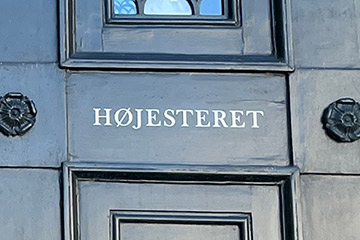The Danish Supreme Court: Arbitral awards are binding
05 February 2016
Danish courts cannot review the correctness of arbitral awards. This was confirmed by the Danish Supreme Court in a judgment of 28 January 2016.
An arbitral award made in proceedings between a foreign company and a Danish company ordered the foreign company to pay DKK 20,000,000. The arbitral award was made by a Danish arbitration tribunal and the case was heard under the rules of the Danish Institute of Arbitration.
During the proceedings the Danish company claimed damages of DKK 150,000,000 but was "only" awarded DKK 20,000,000, which was to be paid by the foreign company. It was stated in the arbitration tribunal's comprehensive reasoning that the tribunal had compared the parties' points of view and had found on that background that based on an estimate damages could be fixed at DKK 20,000,000.
The foreign company brought the matter before the ordinary Danish courts, claiming that the arbitral award was invalid. The foreign company was not successful in its claim.
The Danish Supreme Court held that the Danish courts cannot examine the merits of an arbitral award or set aside an arbitral award as invalid merely because the Arbitration Tribunal might have misapplied rules of law or misjudged the facts of the matter.
Further, the Danish Supreme Court found that the setting aside of an arbitral award requires the setting aside of fundamental administration of justice principles, for instance that a party has been unable to present its case or that the arbitral award is obviously contrary to the Danish legal system (ordre public), but in the latter case it is not "sufficient" that Danish rules or EU rules are misapplied or that the award is contrary to mandatory rules.
Finally, the Danish Supreme Court found that the fact that the arbitration tribunal estimates damages does not indicate a decision in accordance with "fairness". This is interesting as it is common practice that damages are assessed based on an estimate, and the Danish Supreme Court has established that this is acceptable.
The judgment confirms that arbitral awards are in principle binding on the parties and that the parties can only in extraordinary circumstances have the facts of the matter reviewed in subsequent proceedings before the ordinary courts or have the arbitration tribunal's application of legal rules reviewed.
Accordingly, the Danish Supreme Court to all intents and purposes rules out that a party can use the ordinary courts as appellate courts in arbitration proceedings.
During the proceedings the Danish company claimed damages of DKK 150,000,000 but was "only" awarded DKK 20,000,000, which was to be paid by the foreign company. It was stated in the arbitration tribunal's comprehensive reasoning that the tribunal had compared the parties' points of view and had found on that background that based on an estimate damages could be fixed at DKK 20,000,000.
The foreign company brought the matter before the ordinary Danish courts, claiming that the arbitral award was invalid. The foreign company was not successful in its claim.
The Danish Supreme Court held that the Danish courts cannot examine the merits of an arbitral award or set aside an arbitral award as invalid merely because the Arbitration Tribunal might have misapplied rules of law or misjudged the facts of the matter.
Further, the Danish Supreme Court found that the setting aside of an arbitral award requires the setting aside of fundamental administration of justice principles, for instance that a party has been unable to present its case or that the arbitral award is obviously contrary to the Danish legal system (ordre public), but in the latter case it is not "sufficient" that Danish rules or EU rules are misapplied or that the award is contrary to mandatory rules.
Finally, the Danish Supreme Court found that the fact that the arbitration tribunal estimates damages does not indicate a decision in accordance with "fairness". This is interesting as it is common practice that damages are assessed based on an estimate, and the Danish Supreme Court has established that this is acceptable.
The judgment confirms that arbitral awards are in principle binding on the parties and that the parties can only in extraordinary circumstances have the facts of the matter reviewed in subsequent proceedings before the ordinary courts or have the arbitration tribunal's application of legal rules reviewed.
Accordingly, the Danish Supreme Court to all intents and purposes rules out that a party can use the ordinary courts as appellate courts in arbitration proceedings.







